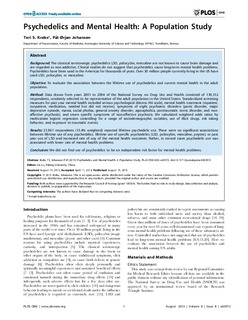| dc.description.abstract | Background
The classical serotonergic psychedelics LSD, psilocybin, mescaline are not known to cause brain damage and are regarded as non-addictive. Clinical studies do not suggest that psychedelics cause long-term mental health problems. Psychedelics have been used in the Americas for thousands of years. Over 30 million people currently living in the US have used LSD, psilocybin, or mescaline.
Objective
To evaluate the association between the lifetime use of psychedelics and current mental health in the adult population.
Method
Data drawn from years 2001 to 2004 of the National Survey on Drug Use and Health consisted of 130,152 respondents, randomly selected to be representative of the adult population in the United States. Standardized screening measures for past year mental health included serious psychological distress (K6 scale), mental health treatment (inpatient, outpatient, medication, needed but did not receive), symptoms of eight psychiatric disorders (panic disorder, major depressive episode, mania, social phobia, general anxiety disorder, agoraphobia, posttraumatic stress disorder, and non-affective psychosis), and seven specific symptoms of non-affective psychosis. We calculated weighted odds ratios by multivariate logistic regression controlling for a range of sociodemographic variables, use of illicit drugs, risk taking behavior, and exposure to traumatic events.
Results
21,967 respondents (13.4% weighted) reported lifetime psychedelic use. There were no significant associations between lifetime use of any psychedelics, lifetime use of specific psychedelics (LSD, psilocybin, mescaline, peyote), or past year use of LSD and increased rate of any of the mental health outcomes. Rather, in several cases psychedelic use was associated with lower rate of mental health problems.
Conclusion
We did not find use of psychedelics to be an independent risk factor for mental health problems. | nb_NO |

